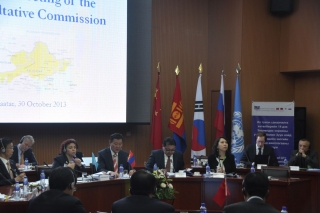ID :
304997
Wed, 10/30/2013 - 11:57
Auther :
Shortlink :
https://www.oananews.org/index.php//node/304997
The shortlink copeid
GTI Consultative committee meeting starts

Ulaanbaatar /MONTSAME/ The 14th meeting of the Consultative Committee of the Greater Tumen Initiative (GTI) and the Northeast Asia Economic Cooperation Forum Wednesday kicked off in Ulaanbaatar.
The Deputy PТ D.Terbishdagva addressed the meeting. ПEnvironmentally-friendly and developmental directions such as social and environmental responsible productions, and adequate economic growth are being dominantly reflected in the economic policies of the GTI members to the extent of increasing of the roles of them in regional and global economy," he underlined. Mongolia is making efforts to join the international and regional economic integration and the infrastructure network in order to ensure the general goal for the regional sustainable development, he added.
One of the features of this year’s GTI’s consultation is establishing the Northeast Asia EXIM Banks Association, comprising Exim banks of the Republic of Korea and China, the Developmental Bank of Mongolia (DBM) and the Russia’s Vnesheconombank. This association’s main function is to collaborate with the GTI and governments of its members in financing economic fruitful projects in the region.
The four-day forum has brought together some 100 delegates such as South Korea’s Vice Minister of Strategic and Financial Affairs; Russia’s Vice Minister of Economic Development; a department head of China’s Ministry of Commerce; the Permanent Representative of China to the United Nations; and other representatives of international banking and financial organizations.
According to profile on its website, the GTI (originally known as the Tumen River Area Development Programme) is an intergovernmental cooperation mechanism among four countries: China, Mongolia, Republic of Korea and Russian Federation, supported by the United Nations Development Programme (UNDP).
In 1995, GTI member governments signed agreements to establish this mechanism, aimed at strengthening economic and technical cooperation, and attaining greater growth and sustainable development in NEA and specially the Greater Tumen Region. In particular, the GTI focuses on the priority areas of transport, trade and investment, tourism, energy, with environment as a cross-cutting sector.
Committing to the vision of building a great partnership for common prosperity between neighbors, the GTI has become an effective platform for regional economic cooperation, expanding policy dialogue, improving business environments and contributing to peace and stability in NEA. In addition, the GTI works closely with important international partners to jointly promote the region, and hosts both the NEA EXIM Banks Association as a regional development financing mechanism, and the Local Cooperation Committee in support of cooperation initiatives among local governments in NEA.
With its skilled and low-cost labor pool, the Greater Tumen Region possesses enormous potential for investment and economic growth. The Tumen River ties this region together at the crossroads of vital trade, transport and energy routes. Rich in gas, oil and minerals, the region has easy access to affluent markets in NEA, representing millions of consumers. This potential can only be fully harnessed through dynamic cooperation among neighbours in the region.
The core decision-making institution of the GTI is the Consultative Commission which is composed of Vice-Ministers from the GTI member governments. The Commission’s role is to foster support for regional cooperation and development, and promote mutual understanding. It convenes annually to discuss key policy issues and cooperation projects among the GTI members, and hosts joint sessions with strategic partners as well as local governments.
Today, the GTI continues to strengthen regional cooperation through policy dialogue and the implementation of priority projects. It has established strong partnerships with regional governments, international organisations and the private sector to jointly promote cooperative activities in NEA. Increased regional cooperation has not only led to economic prosperity and sustainable development, but also significantly contributed to regional solidarity and stability.





